(完整版)4BChapter3复习提要-黄璐
第三单元(知识清单)-【黄冈小状元· 作业本】2022-2023四年级下册语文(广东专版)

第三单元(知识清单)-【黄冈小状元·作业本】2022-2023四年级下册语文(广东专版)一、课文本单元的课文为《爱心与友情》。
主要通过讲述小男孩周涛和小女孩周琳的故事,让孩子们了解到爱心和友情的重要性。
二、生字词1. 爱心爱心是指尊重、照顾他人的感情。
在《爱心与友情》中,作者通过讲述周涛在小区里帮助孤寡老人的事情,让孩子们了解到爱心的重要性。
2. 变化变化指事物因为受到某种原因或条件的变动而出现不同的状态或情况。
在《爱心与友情》中,周涛一次次的为孤寡老人送饭、送水,也让学生们理解到即便环境变化了,我们也要坚持做好自己的事情。
3. 开玩笑开玩笑指说话或行动得体、幽默,让人感到欢乐。
在《爱心与友情》中,周涛用幽默的语言开玩笑,让大家感到轻松快乐。
4. 互助互助指相互帮助,相互支持。
在《爱心与友情》中,周涛主动帮助孤寡老人,也受到周琳的赞赏和支持,从而激发出孩子们的互助精神。
5. 简介作为一种文体形式,简介是用简洁的语言,概括、说明、介绍事物、人物、事件等内容的一种写作形式。
在学习《爱心与友情》之后,孩子们可以根据自己的理解,写一篇简介来介绍这个故事。
三、句子1. “用心去做,放心去等待。
”这是周涛在为孤寡老人送餐时对周琳说的一句话。
这句话强调了用心去做事的重要性,并且告诉孩子们如果认真做事,就不用担心结果。
2. “你的饭,让我们充满了爱心。
”这是孤寡老人在周涛和周琳送饭时对他们说的一句话。
这句话表达了孤寡老人的感激之情,并且也让我们明白,即便是小小的事情也可以充满爱心。
3. “有了你的帮助,我感到如此温暖。
”这是孤寡老人在周涛们送水时对周涛说的一句话。
这句话表达了孤寡老人的感激之情,也让我们明白到互助的重要性。
4. “同学之间应该互相尊重、关心、帮助。
”这是老师在课上对同学们讲的一句话。
这句话告诉同学们互相之间要尊重、关心和帮助,也体现了班级之间的团结和友爱。
5. “人与人之间,总是互相影响。
最新4B-Chapter-2复习提要-黄璐
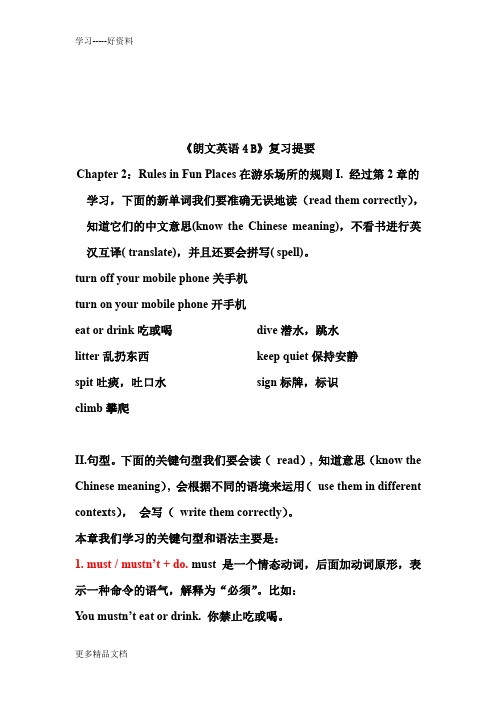
《朗文英语4 B》复习提要Chapter 2:Rules in Fun Places在游乐场所的规则I. 经过第2章的学习,下面的新单词我们要准确无误地读(read them correctly),知道它们的中文意思(know the Chinese meaning),不看书进行英汉互译( translate),并且还要会拼写( spell)。
turn off your mobile phone关手机turn on your mobile phone开手机eat or drink吃或喝litter乱扔东西spit吐痰,吐口水climb攀爬dive潜水,跳水keep quiet保持安静sign标牌,标识II.句型。
下面的关键句型我们要会读(read), 知道意思(know the Chinese meaning), 会根据不同的语境来运用(use them in different contexts),会写(write them correctly)。
本章我们学习的关键句型和语法主要是:1. must / mustn’t + do. must 是一个情态动词,后面加动词原形,表示一种命令的语气,解释为“必须”。
比如:You mustn’t eat or drink.你禁止吃或喝。
You mustn’t spi t. 你禁止乱扔垃圾。
Yo u mustn’t climb.你禁止攀爬。
You mustn’t run. 你禁止奔跑。
You mustn’t dive.你禁止潜水(跳水)。
2. No + doing,表示“禁止”。
这样的句子经常出现在公共场合的标语,用来警示他人。
比如:No eating or drinking. =You mustn’t eat or drin k.禁止吃或喝。
No spitting. =Y ou mustn’t spit. 禁止乱扔东西。
spit 要双写词尾‘t’,再加‘ing’.No clim bing. =You mustn’t climb.禁止攀爬。
4《泛读教程》黄灏doc
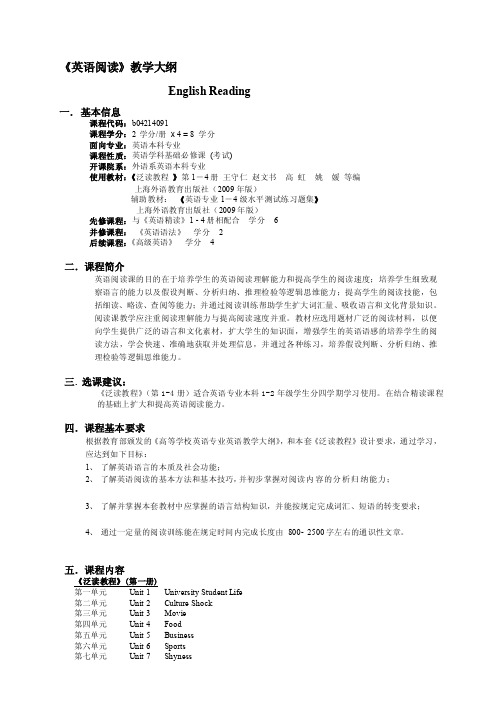
《英语阅读》教学大纲English Reading一.基本信息课程代码:b04214091课程学分:2 学分/册x 4 = 8 学分面向专业:英语本科专业课程性质:英语学科基础必修课(考试)开课院系:外语系英语本科专业使用教材:《泛读教程》第1-4册王守仁赵文书高虹姚媛等编上海外语教育出版社(2009年版)辅助教材:《英语专业1-4级水平测试练习题集》上海外语教育出版社(2009年版)先修课程:与《英语精读》1 - 4册相配合学分6并修课程:《英语语法》学分2后续课程:《高级英语》学分4二.课程简介英语阅读课的目的在于培养学生的英语阅读理解能力和提高学生的阅读速度;培养学生细致观察语言的能力以及假设判断、分析归纳、推理检验等逻辑思维能力;提高学生的阅读技能,包括细读、略读、查阅等能力;并通过阅读训练帮助学生扩大词汇量、吸收语言和文化背景知识。
阅读课教学应注重阅读理解能力与提高阅读速度并重。
教材应选用题材广泛的阅读材料,以便向学生提供广泛的语言和文化素材,扩大学生的知识面,增强学生的英语语感的培养学生的阅读方法,学会快速、准确地获取并处理信息,并通过各种练习,培养假设判断、分析归纳、推理检验等逻辑思维能力。
三. 选课建议:《泛读教程》(第1-4册)适合英语专业本科1-2年级学生分四学期学习使用。
在结合精读课程的基础上扩大和提高英语阅读能力。
四.课程基本要求根据教育部颁发的《高等学校英语专业英语教学大纲》,和本套《泛读教程》设计要求,通过学习,应达到如下目标:1、了解英语语言的本质及社会功能;2、了解英语阅读的基本方法和基本技巧,并初步掌握对阅读内容的分析归纳能力;3、了解并掌握本套教材中应掌握的语言结构知识,并能按规定完成词汇、短语的转变要求;4、通过一定量的阅读训练能在规定时间内完成长度由800- 2500字左右的通识性文章。
五.课程内容《泛读教程》(第一册)第一单元Unit 1 University Student Life第二单元Unit 2 Culture Shock第三单元Unit 3 Movie第四单元Unit 4 Food第五单元Unit 5 Business第六单元Unit 6 Sports第七单元Unit 7 Shyness第八单元Unit 8 Native People第九单元Unit 9 Bible Stories第十单元Unit 10 Festivals and Holidays第十一单元Unit 11 Advertising第十二单元Unit 12 Agriculture《泛读教程》(第二册)第一单元Unit 1 Reading第二单元Unit 2 Music第三单元Unit 3 Generation第四单元Unit 4 Weather and Climate第五单元Unit 5 Work第六单元Unit 6 The African A merican第七单元Unit 7 Greek Stories第八单元Unit 8 Attitude Towards Life第九单元Unit 9 First Aid第十单元Unit 10 Marriage第十一单元Unit 11 Creativity第十二单元Unit 12 Travel《泛读教程》(第三册)第一单元 Unit 1 Reading Strategies第二单元 Unit 2 Education第三单元 Unit 3 Body language第四单元 Unit 4 Animals第五单元 Unit 5 History第六单元 Unit 6 Language第七单元 Unit 7 Space第八单元 Unit 8 Women第九单元 Unit 9 Cities第十单元 Unit 10 Cross-cultural Communication 第十一单元 Unit 11 Information Retrieval第十二单元 Unit 12 Environment《泛读教程》(第四册)第一单元Unit 1 Language Testing第二单元Unit 2 Exploration第三单元Unit 3 Refugee第四单元Unit 4 Cigarettes第五单元Unit 5 Globalization第六单元Unit 6 Immigrants第七单元Unit 7 Ecology第八单元Unit 8 Holocaust第九单元Unit 9 Diplomatic Practice第十单元Unit 10 Christianity第十一单元Unit 11 Politics第十二单元Unit 12 Art六.课内实验名称及基本要求(略)七.教学进度(第1 - 4册基本进度如下 , 可作适当调整)第一单元 2 课时/周第二单元 2 课时/周第三单元 2 课时/周第四单元 2 课时/周第五单元 2 课时/周第六单元 2 课时/周第七单元 2 课时/周第八单元 2 课时/周第九单元 2 课时/周第十单元 2 课时/周第十一单元 2 课时/周第十二单元 2 课时/周八.作业按照教材每章节作业分为两个部分;1.课前预习课堂必须要求全部完成的部分。
4B_Unit3课件
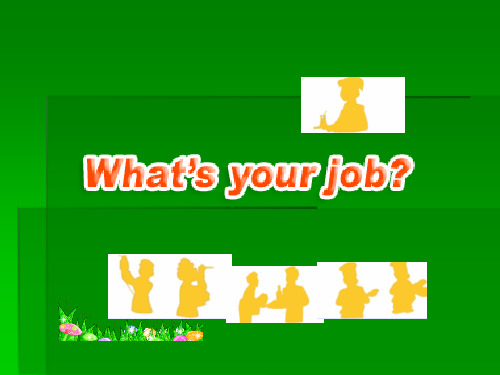
Name card
Name: Wang Wei
Age: Job:
23 policeman
a a policewoma policeman n A: What’s his/her job? B: He’s/She’s a … .
Name card
Name: Age: Li Dong 21
Job:
Name card
Name: Age:(年龄)Liu Nhomakorabeaang 31
Job:
doctor
(职业)
Name card
Name: Age: Zhang Mei 26
Job:
nurse
Name card
Name: Age: Li Ming 38
Job:
teacher
job: 职业;工作
my job, his job, Nancy’s job, my father’s job …
a driver dress draw
?
?
?
A: What are their jobs? B: They’re …. .
waiters
coo k farmer waitress
cooks farmers waitresses
policewom policewom an en
A: What’s your job? B: I’m a policeman.
B: He’s a cook.
A
B
A: What’s her job? B: She’s a waitress.
A
B
Let’s practice!
选择题: 1.A:What’s C job? B: I’m a worker.
(完整版)朗文4AChapter3复习提要

《朗文英语4A》复习提要Chapter 3:When our grandparent s were young当我们爷爷奶奶(外婆外公)小的时候I. 经过第3章的学习,下面的新单词我们要准确无误地读(read them correctly),知道它们的中文意思(know the Chinese meaning),不看书进行英汉互译(translate),并且还要会拼写(spell)。
*注意:an air-con 一台空调II.句型。
下面的关键句型我们要会读(read), 知道意思(know the Chinese meaning), 会根据不同的语境来运用(use them in different contexts),会写(write them correctly)。
-- Was there any cola when you were young,G randpa?-- Yes, there was. (肯定回答)-- Was there any fast food when you were young?-- No, there wasn’t.(否定回答)-- Were there any air-con s when you were young, G randma?-- Yes, there were.(肯定回答)-- Were there any mobile phone s when you were young, G randma? -- No, there weren ’t .(否定回答)总结:当名词是可数名词单数或不可数名词时,be 动词用单数(is ,was)。
当主语是可数名词的复数时, be 动词用复数(are, were )。
总结如下:is/was + 不可数名词/ 可数名词单数are/were + 可数名词复数some 和any 的用法如下:some 用在肯定句中any 用在疑问句或否定句中 *注意:Grandpa 和Grandma 一般用语口语称呼,其结构一般是“…,Grandpa/Grandma ”。
B4B答案
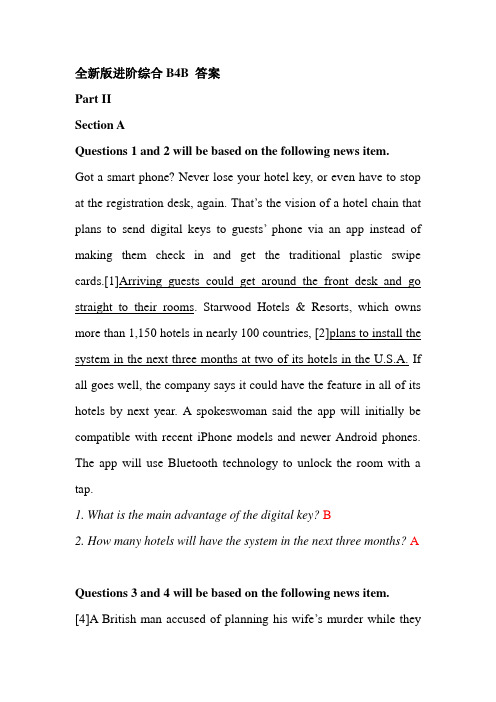
全新版进阶综合B4B 答案Part IISection AQuestions 1 and 2 will be based on the following news item.Got a smart phone? Never lose your hotel key, or even have to stop at the registration desk, again. That’s the vision of a hotel chain that plans to send digital keys to guests’phone via an app instead of making them check in and get the traditional plastic swipe cards.[1]Arriving guests could get around the front desk and go straight to their rooms. Starwood Hotels & Resorts, which owns more than 1,150 hotels in nearly 100 countries, [2]plans to install the system in the next three months at two of its hotels in the U.S.A. If all goes well, the company says it could have the feature in all of its hotels by next year. A spokeswoman said the app will initially be compatible with recent iPhone models and newer Android phones. The app will use Bluetooth technology to unlock the room with a tap.1. What is the main advantage of the digital key? B2. How many hotels will have the system in the next three months? AQuestions 3 and 4 will be based on the following news item. [4]A British man accused of planning his wife’s murder while theywere honeymooning in South Africa has lost a High Court appeal to block his being sent back to Britain until he is fit to stand trial.[3]The judges ruled that Shrien Dewani can be sent back as long as the South African government pledges to return him to the United Kingdom should he ultimately prove unfit to be tried. Dewani’s lawyers had urged that he should not be sent back while he was unfit to stand trial. He is being treated for a depressive illness. His legal team can appeal the decision at the Supreme Court. [4]Dewani is accused of hiring a crew of criminals to kill his wife, Anni Dewani, during a taxi ride in Cape Town last November, just over two weeks after their wedding.3. What can we learn about Shrien Dewani according to the court ruling? A4. What was Dewani accused of? DQuestions 5 to 7 will be based on the following news item. Dozens of children at a Utah Elementary School had their lunch trays taken away from them before they could take a bite this week. Salt Lake City School District officials said the trays were taken away at Utah Elementary School Tuesday [5]because some students had negative balances in their accounts used to pay for lunches. But they admit the situation should have been handled differently.Instead of regular lunches, the students were given fruit and milk. “We don’t ever let kids go without and food entirely,” said Salt Lake City School District spokesman Jason Olsen. [6]One mother said, she was “blindsided”when her daughter described what a school district official told her: “You don’t have any money in your account, so you can’t get lunch.” “There were a lot of tears,” she said, “and it was pretty upsetting for them.”[7]The district said it started notifying parents about negative account balances Monday. But the mother said she and other parents were never told about the problem.5. Why were some children offered only fruits and milk for lunch? C6. How did parents react to the school’s way of handling the situation? B7. When were the parents informed of negative balances according to the district? CSection BConversation OneM: Hi, Diana. I’m surprised to see you on the city bus. Your car in the shop?W: No. [8]I’ve just been thinking a lot about the environment lately.So I decided the air will be a lot cleaner if we all use public transport when we could.M: I am sure you are right. The diesel bus isn’t exactly pollution free.W: True. They’l l be running a lot cleaner soon. [9]We were just talking about that in my environmental engineering class.M: What could be the city do? Install pollution filters in all their buses?W: They could, but those filters make the engines work harder and really cut down on the fuel efficiency. Instead, they found a way to make their engines more efficient.M: How?W: Well, there is a new insulator. And you spray a thick coat of it on the engine.M: An insulator?W: Yeah. [10]What it does is reflect back the heat of burning fuel. So the fuel will burn much hotter and burn up more completely.M: So a lot less unburned fuel comes out to pollute the air.W: And the bus will need less fuel. So with the saving on fuel cost, they say this will all pay for itself in just six months.8. Why does Diana take a bus that day? A9. What is true about Diana? C10. What justifies the installation of a new insulator in the buses according to Diana? A11. What is the major concern of the woman? DConversation TwoM: Hi. I have a reservation for tonight. My name is Charles Nelson. W: Okay. Mr. Nelson. That’s a room for five under your name.M: No. No. Hold on. [12]There must be some mistakes.W: Okay. Let’s check this again. Okay, Mr. Charles C. Nelson for tonight…M: Ah. There’s t he problem. My name is Charles Nelson, not Charles C. Nelson. [12]You must have two guests under the name. W: Okay. Let me check this again. Oh. Okay. Here we are. Charles Nelson. A room for one for the 19th…M: Wait, wait! It was for tonight. Not tomorrow night.W: Hum. Hum. I don’t think we have any rooms for tonight.[13]There’s a convention going on in town, and uh, let’s see. Yeah, no rooms. Well. [14]We do have some rooms under renovation with just a roll-away bed. None of the normal stuff like a TV or working shower or toilet.M: Ah madam. Come on. There must be something else.W: Well. Let me check my computer here. Ah! There has been a cancellation for this evening [15]A honeymoon suite is now available.M: Great. I’ll take it.W: [15]But I’ll have to charge you two hundred fifty dollars for the night.M: Ah madam. I should get a discount for the inconvenience.W: Well. [15]The best I can give you is a ten percent discount plus a ticket for a free continental breakfast.12. What was the first proble m with the man’s reservation? A13. Why was it hard to get a room that day? C14. What do we know about the rooms under renovation in the hotel? C15. What did the man get finally? BSection CPassage OneTelevision now plays such an important part in so many people’s lives that it is essential for us to try to decide whether it is a blessing or a curse. Obviously television has both advantages and disadvantages. But do the former outweigh the latter? In the first place, television is not only a convenient source of entertainment, but also a comparatively cheap one. They just sit comfortably at home and enjoy endless series of programs rather than to go out in search of amusement elsewhere. Some people, however, maintainthat this is precisely where the danger lies. The television viewer needs to do nothing. [16]He is completely passive and has everything presented to him without any effort on his part. Secondly, television keeps one informed about current events, allows one to follow the latest development is science and politics. Yet here again there is a danger. The television screen itself has a terrible, almost physical fascination for us. [16] We get so used to looking at its movements, so dependent on its pictures that it begins to dominate our lives. There are many other arguments for and against television.[16] The poor quality of its program is often criticized. But it is undoubtedly a great comfort to many lonely elderly people. And does it corrupt or instruct our children? [17] I think we must realize that television in itself is neither good nor bad. [18]It is the uses to which it is put that determine its value to society.16. What is NOT mentioned as the disadvantages of TV? A17. What is the speaker’s opinion of television? D18. What determines the value of television to society? CPassage TwoBeethoven probably began to go deaf in 1707, but he tried to keep it a secret, while consulting doctors and trying various remedies, such as the application of almond oil. [19]He was extremely anxiousabout its possible effect on his career as a musician, and embarrassed by its effect on his social life. In the summer of 1801 he wrote to two friends expressing the anxiety that his best years would pass “without my being able to achieve all that my talent and my strength have commanded me to do.”Although tempted to kill himself, “the only thing that held me back was my art. For indeed it seemed to me impossible to leave this would before I had produced all the works that I felt the urge to compose”. It could be argued that Beethoven’s deafness helped the development of his art: isolated from the world, and unable to perform, he could devote all his time to composing.[20]In 1804 his friend Stephan von Breuning, with whom he briefly shared lodgings, wrote to Franz Wegler about the terrible effect his gradual loss of hearing was having on Beethoven: it had caused him to distrust his friends and he was becoming very difficult to be with. But about all else, Beethoven was dedicated to his art and the urge to compose remained with him throughout his life. [21]It may be that he shielded away from the commitment of marriage because he knew it would interfere with his art.19. Why did Beethoven try to conceal his going deaf? D20. What was the result from Beethoven’s gradual loss of hearing in 1804? C21. What do we know about Beethoven in this passage? BPassage ThreeOver the years, new technologies have changed farming. Change in a general direction is a trend. Yet people often recognize trends only when they consider the past. Today, we look back at some trends in American agriculture. [22]In 1920, America had more than 25 million horses and mules. Most were used for farm work.[22]Around the same time, a competitor began to appear in large numbers. Tractors could turn soil, pull loads and speed harvests –and they could do it better. More tractors meant fewer horses and mules. [23]By the 1960s, the numbers of these work animals settled to where they remain today. That is about one-tenth the levels in 1920. Yet even the demand for tractors had its limits. Their numbers have been slowly decreasing since 1982. Experts say farmers can do more with less now because of new technologies. As tractors replaced horses and mules, farmers no longer needed to raise crops to feed work animals. Oats have long been food for horses and mules. In 1954, American farmers planted over sixteen million hectares of oats. By 2000, that was down to less than one million hectares. So what did the farmers do with the extra land? More and more farmers began to plant a new crop around the same time that the tractor became popular. It was the soybean. The soybean is oneof the oldest plants harvested. Yet it was not planted widely in the United States until the 1920s. By the year 2000, close to 30 million hectares were planted with soybeans. [24] It is the nation’s most important crop for high-protein animals feed and for vegetable oil.[25] In fact, soybeans are the second most valuable crop grown by American farmers after corn. Much of the soybean production goes to exports.22. In which year did tractors begin to appear in large number? A23. How many horses and mules did America have in 1960s? D24. What is America’s most important crop for high-protein animal feed and for vegetable oil? B25. What is the most valuable crop grown by American farmers? A26.K 27.H 28.Q 29.M 30.A 31.B 32.F 33.S 34.H 35.I36. A 37.D 38.C 39.C 40.A41.D 42.B 43.A 44.B 45.C46.E 47. J 48.D 49.K 50.L 51.G 52.O 53.I 54.H 55.MTranslation:As one of Chinese traditional art forms, Chinese painting originates from calligraphy. Conventionally, China’spainting is directly related to calligraphy. In the eyes of Chinese people, a traditional scholar should be able to master the skills of painting, calligraphy, poetry and music. The painting is the exterior show of people’s inner world. Many people cannot realize their personal ambitions or lifelong aims, so they resort to painting in which their ideals can be expressed. Through this artistic form, we can gain/have access to many different cultures.。
黄瑚 中国史笔记(不全)
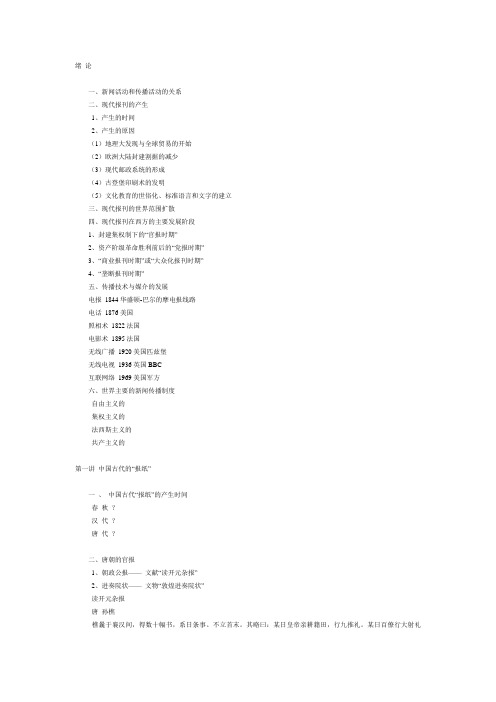
绪论一、新闻活动和传播活动的关系二、现代报刊的产生1、产生的时间2、产生的原因(1)地理大发现与全球贸易的开始(2)欧洲大陆封建割据的减少(3)现代邮政系统的形成(4)古登堡印刷术的发明(5)文化教育的世俗化、标准语言和文字的建立三、现代报刊的世界范围扩散四、现代报刊在西方的主要发展阶段1、封建集权制下的―官报时期‖2、资产阶级革命胜利前后的―党报时期‖3、―商业报刊时期‖或―大众化报刊时期‖4、―垄断报刊时期‖五、传播技术与媒介的发展电报1844华盛顿-巴尔的摩电报线路电话1876美国照相术1822法国电影术1895法国无线广播1920美国匹兹堡无线电视1936英国BBC互联网络1969美国军方六、世界主要的新闻传播制度自由主义的集权主义的法西斯主义的共产主义的第一讲中国古代的―报纸‖一、中国古代―报纸‖的产生时间春秋?汉代?唐代?二、唐朝的官报1、朝政公报——文献―读开元杂报‖2、进奏院状——文物―敦煌进奏院状‖读开元杂报唐孙樵樵曩于襄汉间,得数十幅书,系日条事。
不立首末。
其略曰:某日皇帝亲耕籍田,行九推礼。
某日百僚行大射礼于安福楼南。
某日安北奏诸藩君长请扈从封禅。
某日皇帝自东封还,赏赐有差。
某日宣政门宰相与百僚廷争一刻罢。
如此,凡数十百条。
樵当时未知何等书,徒以为朝廷近所行事。
有自长安来者,出其书示之,则曰:―吾居长安中,新天子嗣国及穷奴自溃,则见行南郊礼,安有籍田事乎?况九推非天子礼耶?又尝入太学,见丛甓负土而起若堂皇者,就视得石刻,则射堂废已久矣。
国家安能行大射礼耶?自关以东,水不败田,则旱败苗,百姓入常赋不足,至有卖子为豪家役者。
吾尝背华走洛,遇西戍还兵千人,县给一食,力屈不支。
国家安能东封?…… 武皇帝御史以窃议宰相事,望岭南走者四人……安有廷争事耶?‖语未及终,有知书者自外来,曰:―此皆开元政事,盖当时条报于外者‖樵后得《开元录》验之,条条可复。
然尚以为前朝所行,不当尽为坠典。
及来长安,日见条报朝廷事者,徒曰今日除某官,明日授某官,今日幸于某,明日畋于某,诚不类数十幅书。
CONTENTS

Nov.2023㊀㊀Journal of Southwest Jiaotong University(Social Sciences)㊀㊀Vol.24㊀No.6CONTENTSReview of Translation Studies on Xi Jinping:The Governance of China since the18th CPCNational Congress YANG Anwen㊀ZHANG Wenli㊀TAN Yao(1) Multiple Case Study of Deepening Excellent Regional Culture Education inColleges and Universities LIU Yousheng㊀CHEN Lijing(19) The Influence of Relative Poverty on the Language Competence Development of Children and Adolescents in the Post-PovertyAlleviation Period LYU Junwei㊀YU Jian㊀ZHANG Fengjuan(33) Magician and Master:Taoist Lin Lingsu in the Biographies of Southern Song Dynasty LI Kejing(50) The Influence of Social Stratification on the Fertility Desire ofWomen of Childbearing Age from the Perspectiveof Cost-Utility SUN Shiguang㊀QIU Menghua㊀ZHAO Feng(67) Analysis of The Impact of Income Uncertainty on SubjectiveWell-being of Rural Residents in Ethnically Underdeveloped Areas:Also on The Heterogeneous Effect in DifferentAge Groups ZHAO Pengfei㊀Hou Yanmei㊀Wang Hongjian(84) The Urban Heritage Protection Strategy of SeekingSpace from Underground in Central CityTaking Xuzhou City as an Example HUANG Chao㊀QIU Jian㊀TAN Xiaohong(99) Qian-Gu Shifa :The Zong and Evolvement of Grammar Theory ofHistory and Literature in Song and Yuan Dynasties:With a Further Discussion on the Pros andCons of Ban Gu and Sima Qian XIE Wenhui(118) A Study of the Birth Year and Death Year ofLI Changhe and His Family and Life YANG Yanhui㊀LüBin(130)西南交通大学学报(社会科学版)㊀2023年11月JOURNAL OF SOUTHWEST JIAOTONG UNIVERSITY Nov.2023第24卷㊀第6期(Social Sciences)Vol.24㊀No.6‘西南交通大学学报“(社会科学版)第24卷(2023)总目次第1期(总第133期)强化现代化建设人才支撑的战略性地位 笔谈何㊀宪㊀李志刚㊀吴㊀江㊀等(1)生态治理现代化的意识形态批判及中国方案史小宁㊀郝相赟(22)基于图形网格转译的城轨列车外观设计研究支锦亦㊀苏㊀星(36)论智能网联汽车发展的法律障碍与应对杨㊀珊㊀张莎莎(49)教育类国际非政府组织的组织结构与运行机制考察基于五个教育类国际非政府组织的调研闫月勤㊀郑㊀淳㊀王海超(62)青藏铁路精神融入高校思想政治教育的价值意蕴与实践理路陈㊀晨(78)基于官方新闻报道的地方政府公信力文本分析王益君㊀魏美云(90)公众参与㊁资源能力与政务微博信息发布基于新浪微博平台大数据及统计年鉴小数据的实证研究苏㊀慧㊀冯小东㊀王㊀瑶㊀等(104)五四运动中唐山‘救国“报述略田㊀丹(121)李斐英教授早年在美求学经历补遗基于美国罗切斯特大学和雪城大学等原始档案的考察郑博仁(132)第2期(总第134期)营创理论:构造创新人才生态的一个新框架赵永乐㊀吴㊀江(1)中国式现代化与马克思主义中国化时代化新境界 笔谈(16)‘摆脱贫困“蕴涵的扶贫开发重要论述及对新时期推进乡村振兴的启示马改艳(33)从巡检司到汛塘:清代道路安全管理系统中的角色嬗替贾㊀强(50)三线铁路建设中的支农工作研究以湘黔㊁枝柳铁路湖南段为中心岳小川㊀宋银桂(60)241西南交通大学学报(社会科学版)第24卷高校教师薪酬体系的历史演进和国际经验兼论绩效杠杆在 双一流 建设中的必然性局限邱延峻(75)去理想化 :对西方国家高等教育国际化实践类型的再审视郑㊀淳㊀刘长军(91)庄延龄‘离骚“英译本中的神话术语翻译策略探析俞森林㊀雷佳豪(109)以翻译为名的文化传播与文化反拨辜鸿铭‘中庸“英译文化解读熊建闽(119)动词及物性和句子及物性的区隔和关联胡月月㊀杨㊀玲(130)第3期(总第135期)中国共产党意识形态建设的历史考察㊁基本经验及实践指向王永凤㊀杨忠林(1)以共享发展促共同富裕:共产主义理想的发展逻辑林宇晖㊀傅红冬(18)谁是持摄影机的人?众包纪录片初探刘广宇㊀王成莉(32)移动数据流量运营策略对数字鸿沟的影响研究华㊀波㊀江燕伶(47)生态环境保护与旅游业发展协同推进研究王婷伟㊀张㊀慧(73)旅游凝视下三河古镇典型旅游意象元素分析基于隐喻抽取技术陈㊀前㊀韩光明(89)革命化的仪式运作:基于中央苏区时期纪念活动的考察吴承望(104)延安时期陕甘宁边区的新秧歌与乡村群众的思想改造徐桂裕(119)从部落首领到中华民族共祖:晚清民国时期黄帝形象重塑及影响赵晨韵(134)341第6期2023年总目次第4期(总第136期)人工智能与马克思主义理论学科交叉研究笔谈田永鸿㊀韩冬雪㊀吴满意㊀王伯鲁㊀闫坤如㊀谢㊀瑜㊀杨一帆(1)国内主流媒体 双碳 话语中的中国国家形象建构基于语料库的积极话语分析周晓春(12)论段玉裁认定诗韵 古合韵 的原则与方法刘忠华(26)道器之间:近代思想视野下的铁路㊁中国与世界(1875 1936)叶㊀舒㊀宋桂杰(45)路地纠葛:光绪前中期的筑路争议与洋务派的因应陈明亮(59)我国灾难心理学学科建设发展路径研究宁维卫㊀侯牧天㊀薛亦菲㊀等(73)我国农村老龄政策演进研究 基于1982 2021年农村老龄政策的文本分析陈松林㊀余㊀雨㊀刘㊀婷(92)公务员组织公民行为发展现状研究孙京昊㊀赵普光(107)新制度主义视野下的体育暴力研究陈㊀卓㊀李丽芬(122)批判法益论的另一种可能一个刑罚哲学的视角刘继烨(139)第5期(总第137期)习近平外交思想中的人民性研究王秋怡(1)共同富裕视域下人民美好生活的建构逻辑师嘉唯㊀成㊀龙(17)新疆资源型城市系统演化分析及发展路径探索于㊀洋㊀吴冰瑕㊀吴茸茸㊀等(34)基于单条线路的城乡一体化公交补贴效率研究卓高鸿㊀詹朝曦㊀高悦尔(52)日本学者村上哲见的姜夔词研究邱美琼㊀杨㊀操(65)译者前见,时间距离与翻译胡作友㊀钟莎莉(76)厨房㊁闺阁与职场:论徐小斌小说中的女性空间李燕妮(88)441西南交通大学学报(社会科学版)第24卷 游戏三昧 的禅学内涵与诗学意义王㊀悦㊀张㊀勇(100)张载 性二元论 的思想渊源及其当代启示吴喜双㊀张培高(113)从黑格尔到阿甘本:辩证法的虚无主义问题及其解决路径陈㊀琦(128)第6期(总第138期)党的十八大以来‘习近平谈治国理政“翻译研究综述杨安文㊀张文莉㊀谭㊀瑶(1)高校深化优秀地域文化育人的多案例研究刘有升㊀陈丽静(19)后脱贫时期相对贫困对儿童青少年语言能力发展的影响吕军伟㊀俞㊀健㊀张凤娟(33) 妖道 与 高道南宋传记文中的林灵素形象李珂菁(50)社会分层与育龄女性多孩生育意愿基于 成本 效用 的分析孙士光㊀邱梦华㊀赵㊀凤(67)收入不确定性对农村居民幸福感的影响分析赵朋飞㊀侯艳梅㊀王宏健(84)中心城区 向地下要空间 的城市遗产保护策略以徐州市为例黄㊀超㊀邱㊀建㊀谭晓红(99) 迁固史法 :宋元史笔文法理论之宗及其流衍兼谈班马优劣论谢文惠(118)理鬯和生卒年及家世生平考杨颜珲㊀吕㊀斌(130)西南交通大学学报(社会科学版)㊀2023年11月JOURNAL OF SOUTHWEST JIAOTONG UNIVERSITY Nov.2023第24卷㊀第6期(Social Sciences)Vol.24㊀No.6Journal of Southwest Jiaotong University(Social Sciences)Vol.23㊀2022CONTENTSNo.1(Sum133)Ideological Criticism of Ecological Governance Modernization andChina s Solutions SHI Xiaoning㊀HAO Xiangyun(22) A Research on Urban Rail Train Appearance Design Based OnGraphic Grid Translation ZHI Jinyi㊀SU Xing(36)Legal Barriers and Countermeasures to the Development of IntelligentConnected Vehicles YANG Shan㊀ZHANG Shasha(49) The Research on the Organizational Structure and Operating Mechanism of EducationalInternational Non-Governmental Organizations from the Perspective of Global Governance:A Comparative Study of Five EducationalInternational NGOs YAN Yueqin㊀ZHENG Chun㊀WANG Haichao(62) The Value Implication and Practical Path of Integrating the Spirit of Qinghai-Tibet Railway into theIdeological and Political Education in Colleges and Universities CHEN Chen(78) Text Analysis of Local Government Credibility Based onOfficial News Reports WANG Yijun㊀WEI Meiyun(90) Public Participation,Resource Capacity and Government Microblog Information Publish:An Empirical Study Based on Big Data of Sina Weibo and Small Data fromStatistical Yearbook FENG Xiaodong㊀SU Hui㊀WANG Yao㊀ZHANG Yipei㊀CHEN Xi(104) A Brief Research on National Salvation Weekly fromTangshan Engineering College During the May4th Movement TIAN Dan(121) A New Supplement to Professor Fei Ing Li s Study Experience in the United States:Investigation Based on the Original Archives Mainly from theUniversity of Rochester and Syracuse University ZHENG Boren(132)No.2(Sum134)Innovation-fostering Theory:A New Framework for ConstructingInnovative Talent Ecology ZHAO Yongle㊀WU Jiang(1) The Important Discourse of Development-oriented Poverty Alleviation in641西南交通大学学报(社会科学版)第24卷 Up and Out of Poverty and Its Enlightenment forPromoting Rural Revitalization in New Era MA Gaiyan(33) From Xunjiansi to Xuntang:The Role Substitution of Road Safety ManagementSystem in Qing Dynasty JIA Qiang(50)A Study on Supporting Rural in the Tier-3Railroad Construction:Centered on the Hunan Section of Hunan-Guizhou andZhicheng-Liuzhou Railways YUE Xiaochuan㊀SONG Yingui(60)Historical Review and International Experiences of University Faculty Salary System:With Discussion on Limitation of Faculty Rewarding Policy inDouble Excellence Project QIU Yan-jun(75)De-idealization :A Re-examination of the Practice Types of Internationalizationof Higher Education Among Western Countries ZHENG Chun㊀LIU Changjun(91)On the Translation Strategies of Mythological Terms inEdward H.Parker s English Translation of Li Sao YU Senlin㊀LEI Jiahao(109) Cultural Transmission and Counteraction in the Name of Translation:Cultural Interpretation of EnglishTranslation of Zhongyong by Ku Hung-ming XIONG Jianmin(119)Distinctions and Interaction BetweenVerb Transitivity and Sentence Transitivity HU Yueyue㊀YANG Ling(130)No.3(Sum135)The Historical Investigation,Basic Experience and PracticalOrientation of the Ideological Construction of theCommunist Party of China WANG Yongfeng㊀YANG Zhonglin(1)Promoting Common Prosperity Through Shared Development:The Development Logic of Communist Ideals LIN Yuhui㊀FU Hongdong(18)Who is the Man with a Movie Camera?A Preliminary Study ofCrowdsourced Documentary LIU Guangyu㊀WANG Chengli(32)A Research on the Impact of Mobile DataTraffic Operation Strategy on the Digital Divide HUA Bo㊀JIANG Yanling(47) Research on Coordinated Promotion of Ecological Environmental Protectionand Tourism Development WANG Tingwei㊀ZHANG Hui(73)Typical Tourism Image Elements of Sanhe Ancient Town Analyzed from theTourist Gaze Perspective:Based on the ZaltmanMetaphor Elicitation Technique CHEN Qian㊀HAN Guangming(89)Revolutionary Ritual Operation:Based on the Commemoration of the Central Soviet Period WU Chengwang(104)741第6期㊀㊀㊀㊀㊀㊀㊀㊀㊀Journal of Southwest Jiaotong University(Social Sciences)㊀Vol.24(2023)The New Yangko and the Ideological Remolding of the RuralMasses in Border Areas of Shanxi Gansu-Ningxia in Yan a n Period XU Guiyu(119) From Ancient Fribal Leader to The Ancestor of The Chinese Nation:The Image Reconstruction and Influence of the YellowEmperor in the Late Qing Dynastyand the Republic of China Period ZHAO Chenyun(134)No.4(Sum136)A Corpus-based Positive Discourse Analysis of China s ImageConstructed by the Domestic Mainstream Media in theContext of Carbon Peak and Carbon Neutrality ZHOU Xiaochun(12)On Principles and Methods of Duan Yucai s Recognition ofAncient Gathering Rhyme in The Book of Songs Rhyme LIU Zhonghua(26) Between Dao and Qi:Railways,China and the World from thePerspective of Modern Thoughts(1875 1936)YE Shu㊀SONG Guijie(45) Disputes over Railway and Land:The Controversy ofRailway Construction and the Response of WesternizationGroup in the Early and Middle Guangxu Period CHEN Mingliang(59)Research on the Development Path of Disaster Psychology Discipline Construction inChina NING Weiwei㊀HOU Mutian㊀XUE Yifei㊀SHEN Yu㊀LI Zhongyi(73)Research on the Evolution of China s Rural Aging Policy:Text Analysis Based on Rural Aging Policiesfrom1982to2021CHEN Songlin㊀YU Yu㊀LIU Ting(92)Research on the Development Status of Organizational CitizenshipBehavior of Civil Servants SUN Jinghao㊀ZHAO Puguang(107)Research on Sports Violence from thePerspective of New Institutionalism CHEN Zhuo㊀LI Lifen(122) Another Possibility of Criticizing the Theory of Rechtgut:A Perspective of Penalty Philosophy LIU Jiye(139)No.5(Sum137)The Study on the People s Character inXi Jinping s Thoughts on Diplomacy WANG Qiuyi(1)The Constructive Logic of People s Better LifeUnder the Perspective of Common Prosperity SHI Jiawei㊀CHENG Long(17)Analysis of Urban System Evolution and Exploration ofDevelopment Paths of Resource-based Cities in Xinjiang YU Yang㊀WU Bingxia㊀WU Rongrong㊀et al(34)841西南交通大学学报(社会科学版)第24卷Research on Subsidy Efficiency of Urban-rural Integrated Public Transport Based onSingle Line ZHUO Gaohong㊀ZHAN Chaoxi㊀GAO Yue e r(52)The Study of Jiang Kui Ci by Japanese ScholarTetsumi Murakami QIU Meiqiong㊀YANG Cao(65) Translator s Prejudice,Time Distance and Translation HU Zuoyou㊀ZHONG Shali(76)Kitchen,Boudoir and Workplace:On the Women s Spaces in Xu Xiao-bin s Fiction LI Yanni(88)The Zen Connotation and Poetic Significanceof Playing in the Joyous Samadhi WANG Yue㊀ZHANG Yong(100)The Origin of Zhang Zai s Idea on the Dualism of Human Natureand Its Contemporary Significance WU Xishuang㊀ZHANG Peigao(113) From Hegel to Agamben:The Problem of Nihilism in Dialectics and Its Solving Route CHEN Qi(128)No.6(Sum138)Review of Translation Studies on Xi Jinping:The Governance of China since the18th CPCNational Congress YANG Anwen㊀ZHANG Wenli㊀TAN Yao(1)Multiple Case Study of Deepening Excellent Regional Culture Education inColleges and Universities LIU Yousheng㊀CHEN Lijing(19)The Influence of Relative Poverty on the Language Competence Development of Children andAdolescents in the Post-Poverty Alleviation Period LYU Junwei㊀YU Jian㊀ZHANG Fengjuan(33) Magician and Master:Taoist Lin Lingsu in the Biographies of Southern Song Dynasty LI Kejing(50) The Influence of Social Stratification on the Fertility Desire of Women ofChildbearing Age from the Perspective of Cost-Utility SUN Shiguang㊀QIU Menghua㊀ZHAO Feng(67) Analysis of The Impact of Income Uncertainty on SubjectiveWell-being of Rural Residents in Ethnically Underdeveloped Areas:Also on The Heterogeneous Effect in Different Age Groups ZHAO Pengfei㊀Hou Yanmei㊀Wang Hongjian(84) The Urban Heritage Protection Strategy of SeekingSpace from Underground in Central CityTaking Xuzhou City as an Example HUANG Chao㊀QIU Jian㊀TAN Xiaohong(99)Qian-Gu Shifa :The Zong and Evolvement of Grammar Theory ofHistory and Literature in Song and Yuan Dynasties:With a Further Discussion on the Pros andCons of Ban Gu and Sima Qian XIE Wenhui(118)A Study of the Birth Year and Death Year of LI Changhe and His Family and Life YANG Yanhui㊀LüBin(130)。
4B Chapter 6复习提要-黄璐
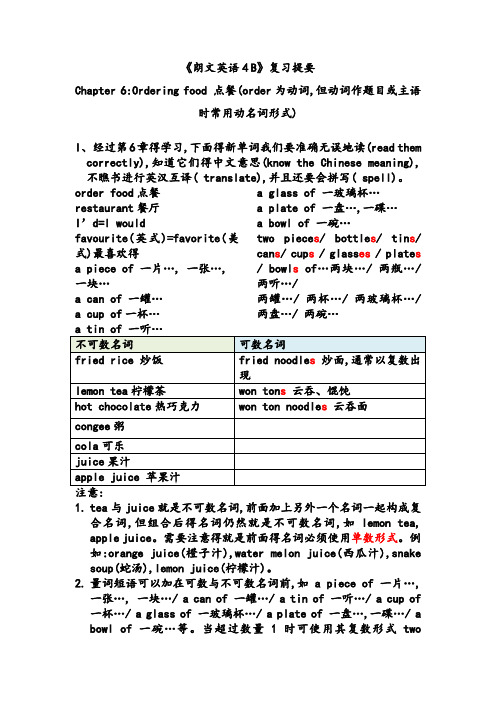
《朗文英语4 B 》复习提要Chapter 6:Ordering food 点餐(order 为动词,但动词作题目或主语时常用动名词形式)I 、 经过第6章得学习,下面得新单词我们要准确无误地读(read themcorrectly),知道它们得中文意思(know the Chinese meaning),不瞧书进行英汉互译( translate),并且还要会拼写( spell)。
order food 点餐 restaurant 餐厅 I ’d=I would favourite(英式)=favorite(美式)最喜欢得 a piece of 一片…, 一张…, 一块… a can of 一罐… a cup of 一杯…a glass of 一玻璃杯…a plate of 一盘…,一碟…a bowl of 一碗…two piece s / bottle s / tin s /can s / cup s / glass es / plate s/ bowl s of …两块…/ 两瓶…/两听…/两罐…/ 两杯…/ 两玻璃杯…/两盘…/ 两碗…1. tea 与juice 就是不可数名词,前面加上另外一个名词一起构成复合名词,但组合后得名词仍然就是不可数名词,如lemon tea,apple juice 。
需要注意得就是前面得名词必须使用单数形式。
例如:orange juice(橙子汁),water melon juice(西瓜汁),snakesoup(蛇汤),lemon juice(柠檬汁)。
2. 量词短语可以加在可数与不可数名词前,如 a piece of 一片…,一张…, 一块…/ a can of 一罐…/ a tin of 一听…/ a cup of一杯…/ a glass of 一玻璃杯…/ a plate of 一盘…,一碟…/ abowl of 一碗…等。
当超过数量1时可使用其复数形式twopiece s/ bottle s/ tin s/ can s/ cup s/ glass es/ plate s/ bowl s of…两块…/ 两瓶…/ 两听…/ 两罐…/ 两杯…/ 两玻璃杯…/ 两盘…/ 两碗…量词得短语后面可直接加不可数如 two piece s of bread, three cup s of hot chocolate;如果加可数名词需要用复数形式表达,如 three plate s of fried noodle s, ten bowl s of won ton noodle s、II、句型。
- 1、下载文档前请自行甄别文档内容的完整性,平台不提供额外的编辑、内容补充、找答案等附加服务。
- 2、"仅部分预览"的文档,不可在线预览部分如存在完整性等问题,可反馈申请退款(可完整预览的文档不适用该条件!)。
- 3、如文档侵犯您的权益,请联系客服反馈,我们会尽快为您处理(人工客服工作时间:9:00-18:30)。
《朗文英语4 B》复习提要Chapter 3:Holiday Plans(假期计划)in Hong Kong本章出现的所有香港地名只需要会读、知道意思,不要求拼写。
I. 经过第3章的学习,下面的新单词我们要准确无误地读(read them correctly),知道它们的中文意思(know the Chinese meaning),不看书进行英汉互译( translate),并且还要会拼写( spell)。
district地区forget to do忘记做某事a beautiful city一个漂亮的城市in Hong Kong在香港flag raising ceremony升旗仪式go shopping购物watch a performance(watch performances)观看表演eat seafood吃海鲜visit the open market参观开放市场see the sea animals(see sea animals)看海洋动物have lunch吃午餐bay海湾peak山顶else其他Causeway Bay铜锣湾Stanley赤柱Ocean Park海洋公园the Peak太平山顶Wan Chai 湾仔Sai Kung西贡Tsim Sha Tsui 尖沙咀II.句型。
下面的关键句型我们要会读(read), 知道意思(know the Chinese meaning), 会根据不同的语境来运用(use them in different contexts),会写(write them correctly)。
本章我们学习的关键句型和语法主要是:1. will表示将来时,后面加动词原型:will+do2. 问句答句时态保持一致。
问句用将来时,答句也用将来时。
3. at后面一般跟小地点,比如at school, at hospital, at home, at the restaurant等等。
4. in后面一般跟大地点,比如国家和城市:in China, in Jiangsu, in Nanjing。
5. I will= I’ll--Where will you go in Hong Kong?在香港,你将会去哪里?--I’ll go t o Ocean Park.我将会去海洋公园。
--What will you do there?在那里(海洋公园),你将会做什么?--I’ll see the sea animals there.我将会去看海洋动物。
--Where else will you go in Hong Kong? 在香港,你还将去哪里?--I’ll go to Wan Chai.我将会去湾仔。
--What will you do there? 在那里(湾仔),你将会做什么?--I’ll go to the flag r aising ceremony.我将会去看升旗仪式。
--Where else will you go in Hong Kong? 在香港,你还将去哪里?--I’ll go to Causeway Bay.我将会去铜锣湾。
--What will you do there? 在那里(铜锣湾),你将会做什么?-- I’ll go shopping there.我将会在那里购物。
--Where else will you go in Hong Kong? 在香港,你还将去哪里?-- I’ll go to Tsim Sha Tsui.我将会去尖沙咀。
--What will you do there? 在那里(尖沙咀),你将会做什么?--I’ll watch a performance there.我将会观看一场演出。
--Where else will you go in Hong Kong? 在香港,你还将去哪里? --I’ll go to Stanley.我将会去赤柱。
--What will you do there? 在那里(赤柱),你将会做什么?--I’ll visit the open m arket there.我将会游览开放市场。
--Where else will you go in Hong Kong?在香港,你还将去哪里? --I’ll go to Sai Kung.我将会去西贡。
--What will you do there?在那里(西贡),你将会做什么?--I’ll eat seafood there.我将会吃海鲜。
--Where else will you go in Hong Kong? 在香港,你还将去哪里?--I’ll go to the Peak.我将会去太平山顶。
--What will you do there? 在那里(太平山顶),你将会做什么?--I’ll have lunch there.我将会吃午餐。
III. C部分学完后,你们要达到以下的要求哦。
1)可以准确而流利地背诵出C部分。
2)对于需要抄写的单词、短语和句子,要求会读、知道意思、知道在何种语境下运用、会拼写。
1.from发件人2.sent发送时间3.a.m.凌晨至中午12点的时间(a.m.和in the morning不重叠使用)4.p.m.(中午12点至凌晨)5.to收件人6.subject主题7.news消息,新闻。
(不可数名词,不是复数)8.for a holiday(表示目的)9.on Sunday在周日10.s how …around带…四处转转11.especially尤其、特别12.C an’t wait to see you.等不及要见你了。
13.pen friend笔友14.make plans做计划15.this Sunday(前面不加介词,比如this year, this morning…)16.t old (tell的过去时)告诉17.for her visit(名词)来访18.s how sb sth=show sth to sb带…看…19.s ome of +复数名词:有些…20.f loat漂浮21.m aybe也许(一般放在句首)22.a ny other+复数名词,放在疑问句中。
23.s uggestion(suggest的名词形式)建议24.F irst…N ext …T hen…A fter that…Finally(事情的先后顺序)3)对于下面的一些词组和句型,我们要准确而流利地读出来、能够英汉互译、会拼写、还要会运用和拓展。
1.I am going to come to Hong Kong for a holiday.be going to + do:将要做…(将来时)What are you going to do tomorrow?I am going to meet my friend at the airport.How are you going to travel?I am going to travel by bus.Who are you going to meet this weekend?I am going to meet my English teacher.2.Cherry’s pen friend was coming to Hong Kong for a holiday.(过去进行时)She was dancing when I saw her.They were doing their homework at 7p.m. last night.I was playing football when my mum came to pick me up.3.Do you have any other suggestions?some other+复数名词,放在肯定句中any other+复数名词,放在疑问句或否定句中I know they will invite some other people too.These books are not interesting. Do you have any other books?Sorry, there aren’t any other books.IV. Part ENew words and phrases for Part E.E部分新单词和词组。
要求:对于以下单词和词组要会读、会英汉互译、书上做笔记部分要会拼写。
cousin堂兄妹,表兄妹November 11月countryside乡村,田园old building老建筑to be visited将被访问hotel旅馆a day out外出一天itinerary行程in time order按时间顺序heritage遗产,遗迹wishing tree许愿树pick sb up 接某人island岛屿(‘s’ is silent)fishing village渔村(fish有钓鱼的意思)suggest建议(suggestion的名词)tour旅行(名词)tour bus观光巴士take back to带回hope希望too tired太疲劳best wishes放在信的末尾,通常以复数形式出现,表示对对方的祝福。
Tai Po大埔Yuen Long元朗Lam Tsuen Wishing Tree 林村许愿树Lo Wai Walled Village老围村Central中环Repulse Bay浅水湾Aberdeen Fishing Village香港仔渔村Hong Kong Island香港岛New sentences for Part E要求:1.对于书上出现的句子,要知道中文意思、会读、会拼写、会运用。
2.能够用First…Next…Then…After that…Finally(At last)来写话。
3.I hope you will not be too tired.will be+名词、形容词、介词短语I will be a teacher next year.I think she will be happy tonight. Because I will buy a birthdaycake for her.I think they will be in the playground 2 hours later. Because theyare going to have a PE lesson.V. Part F. 要求:知道中文意思,会读,能英汉互译brochure小册子Buddha佛像(‘h’ is silent)Disneyland迪斯尼(是个地名,首字母要大些)Part GVI.Part G. 要求: 会背。
